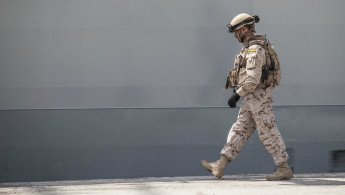NATO to launch 'intelligence hub' in Tunisia
Plans for the development of a new "Tunisian Intelligence Fusion Centre" as announced by NATO in July 2016 seems to be reaching completion according to new documents seen by The New Arab.
Following the announcement last year by NATO Secretary-general Jen Stoltenberg of the venture, members of Tunisia’s government and security establishment continued high-level negotiations with NATO officials for establishment of the new centralised intelligence centre.
Ostensibly the NATO-Tunisia joint effort will see the international body providing support to Tunisia's security services as well as training for Tunisian Special Operation forces.
Yet progress in the establishment of the centre highlights NATO's increasing interest and operational footprint in the strategic North African nation.
In 2014 Tunisia and NATO agreed an "Individual Partnership and Cooperation Programme" that saw Tunisia and the military alliance promising cooperation across a range of areas, including border-security, cyber defence as well as "the fight against terrorism".
A visit by Tunisian Prime Minister to NATO's headquarters in Belgium in 2015 further cemented the agreement. Tunisia has also over the past years seen regular visits by NATO vessels to it ports as well as joint naval-exercises with members of the military alliance.
The completion of the new "Intelligence Fusion Centre" will therefore likely represent a major milestone in the increasing co-operation between NATO and Tunisia and a strategic assert in the military alliance's growing presence across North Africa and sub-Saharan countries.
However, assumptions that the planned centre will serve as a NATO base are unfounded, according to assurances from Tunisian officials.
Questions remain however over exact command-and-control over the centre and whether the centre will ultimately serve as an intelligence unit belonging to NATO.
Meetings between Tunisian officials and NATO representatives included top-level figures from both parties including Tunisian Defence Minister Ferhat Horchani and Army Chief of Staff Brigadier General Ismail Fathalli on the one side and Jen Stoltenberg as well as well NATO Assistant Secretary Alejandro Alvargonzález and NATO Deputy Assistant Secretary General Jonathan Parish on the other.
Tunisian military leaders initially welcomed the plan which saw as crucially strengthening local intelligence capabilities following the spate of terrorist attacks on Tunisian soil over the past years.
The establishment of the new intelligence centre was itself agreed by Tunisia's National Security Council last year with a draft governmental order to establish the centre approved on December 30, 2016, according to then governmental spokes Iyed Dahmani and confirmed by the Official Gazette of Tunisia in January this year.
Previous reports have indicated the new centre would serve as central hub in what is looking like a major overhaul in intelligence sharing across Tunisia's military and security services.
The centre will be made responsible for collating intelligence assessments and coordinating between different national intelligence teams.
It will further serve to provide periodic analyses and assessments of security threats for presentation to the country's National Security Council.
According to documents seen by The New Arab the new intelligence centre will be divided into a number of varied sections and bases each with distinct intelligence gathering purviews. An overview of these their remits include:
- The "geographic intelligence" section, composed of three departments and concerned with providing topographical, meteorological and transport data to guide military plans
- The "technological intelligence" section will host specialised scientific units including those concerned with expertise in electronics, telecommunications, missile guidance as well as biological, chemical and atomic detonations
- A "tactical intelligence" section charged with collection and collation of information on enemy forces in different regions and especially those of terrorist groups. This will directly feed combat forces and commanders in the field with intelligence and tactical espionage.
- The "Strategic Intelligence" section has as its purview the collection and collation but critically the distribution of military and internal security affairs for dissemination across the organs of the state
- The "Preventative Intelligence" section is charged especially with counter-espionage and the elimination and of hostile intelligence activities
- The sixth and seventh bases, concerned with "political" and "economic" intelligence respectively are seemingly focused on political, business and financial activities of influential economic actors across the country
Since the 2011 Tunisian revolution that sparked the Arab Spring, the country has experienced a rise in militant activity that has killed more than 100 soldiers and police, some 20 civilians and also 59 foreign tourists.
Authorities have cracked down on extremists since a November 2015 attack in central Tunis killed 12 members of the presidential guard and a March 2016 attack on the town of Ben Guerdane near the border with Libya.
There has also been a state of emergency in force continuously since the end of 2015.



